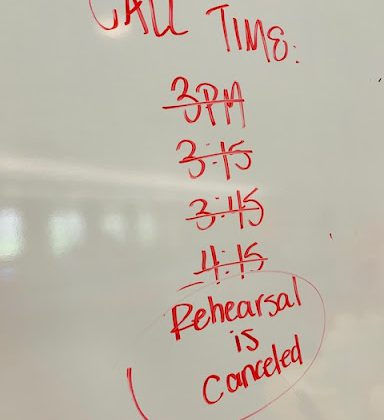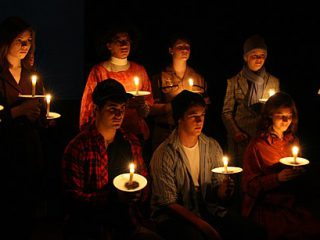Cinco de Mayo is celebrated throughout the United States, and gives us a chance to recognize the contributions of Mexican-American theatre and artists.
The Celebration of Cinco de Mayo
While not a major holiday or celebration in Mexico, Cinco de Mayo (May 5) is widely honored in the United States as a celebration of Mexican heritage. On May 5, 1862, Mexican forces defended the town of Puebla de Los Angeles against French forces. Mexico had declared its independence decades earlier, yet France (under Napoleon) still wanted to carve out territory. In an unlikely victory, Mexican forces under General Ignacio Zaragoza defeated the French army in a battle that lasted less than one day.
Today, Cinco de Mayo is seen as a symbolic assertion of Mexican autonomy and independence. Throughout the United States, communities celebrate Mexican and Mexican-American history, culture, and contributions.
Mexican-American Theatre
Even though Cinco de Mayo is only one day out of the year, it’s important to remember that Mexican-American artists have made profound contributions to theatre and performing arts. There are also theatre companies and academic institutions dedicated to the study and presentation of plays written by and for indigenous and Hispanic people. Many of their works are experimental in style and structure, and utilize Magical Realism (a genre in which an otherwise normal world has magical or fantastical moments). Below is just a small sampling of writers and their contributions to theatre.
Luis Valdez
The “Father of Chicano Theatre,” Luis Valdez founded the El Teatro Campesino in 1965. Originally a part of the United Farm Workers and their movement led by César Chávez, today the Farmworker’s Theatre is dedicated to providing a space for the new generation of artists to offer a just account of human history. Valdez (born in 1958) is also a respected writer, teacher, actor, director, and producer. His best known play is Zoot Suit, based on the Los Angeles Zoot Suit Riots of 1943. It was the first Chicano play on Broadway. Beyond the stage, Valdez became popular for his film La Bamba, the biopic of Ritchie Valens’ rise to fame and tragic death in a plane crash. Valdez still teaches and writes; his most recent play–Valley of the Heart–opened in 2018.
Take a look at the YouTube interview below about his personal life and the founding of El Teatro Campesino.
Octavio Solis
Born in 1958 in Texas, Octavio Solis is notable for his plays that are written for Latino audiences and artists. His most popular play is Lydia, the story of an illegal Mexican immigrant who profoundly changes a devastated family’s life. Santos & Santos is loosely based on a true crime and father-son law firm from the 1980s. He’s also adapted Cervantes’ Don Quixote for the stage. Solis has also written stories and essays about living along the Texas-Mexico border. In 2002, Solis was honored with the National Latino Playwriting Award.
His interview below with the Yale Rep discusses Lydia:
Luis Alfaro
Originally from Los Angeles, Luis Alfaro’s works engage in complex and difficult themes such as poverty, the LGBTQ community, and the AIDS epidemic, all centered in Latino communities. Notably, Alfaro has revised classical mythology to tell the stories of people in contemporary society: Oedipus el Rey engages the questions of fate and destiny within a Chicano community. Mojada: A Medea in Los Angeles takes the story of the scariest mother in mythology and blends it with Mexican folklore to tell the story of the lives of modern immigrants.
Evelina Fernandez
Evelina Fernandez started as an actress; her big breakthrough role was in Luis Valdez’s Zoot Suit. In 1985, she helped found the Latino Theatre Company with her husband Jose Luis Valenzuela. The group is dedicated to commissioning and showcasing works by Chicano and Latinx writers. In 2000, Fernandez wrote and produced Luminarias, a film ( in which she starred) that expressed her frustration with Latina characters consistently portrayed as victims of larger cultural forces. For the stage, Fernandez’s one-act play How Else Am I Supposed to Know I’m Still Alive? showcases two middle-aged Latina women–often underrepresented on the stage–simply talking about their lives in interesting and dynamic ways.
Fernanda Coppel
Born in Mazatlán, Mexico, Fernanda Coppel grew up in San Diego. Coppel originally intended to go to law school, but instead pursued an MFA in playwriting. She is dedicated to writing plays specifically for Latinas. Her most popular play is King Liz, centered on successful sports agent Liz Rico as she fights for her own status in a male-dominated industry. Other plays include Chimichangas and Zoloft, and she has been the recipient of several awards that recognize her work as Latina and queer writer: Asuncion Queer Latino Festival, NYU’s John Holden Award, and the HOLA Helen Mirren Award. As well as writing for the stage, Coppel has written for television on shows such as Rise and How to Get Away With Murder.
Check out the interview below at Windy City Playhouse about King Liz.
If you’d like to learn more about Latino/a playwrights, try these articles:















